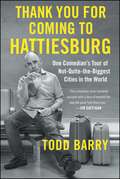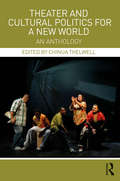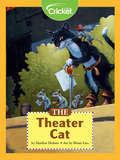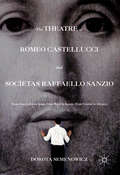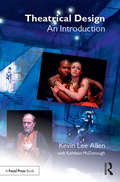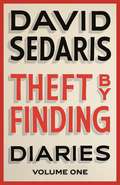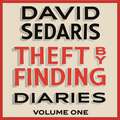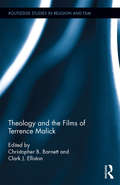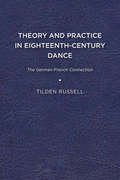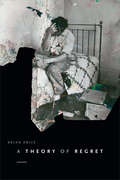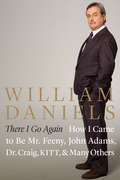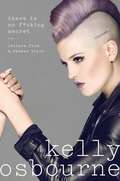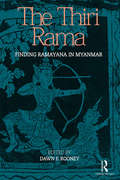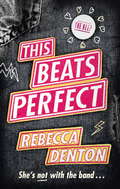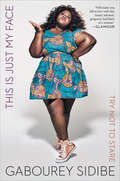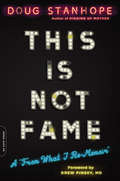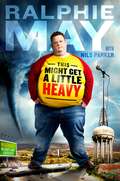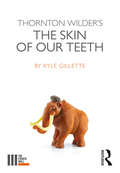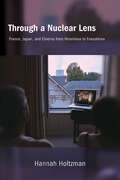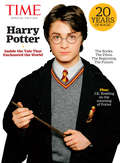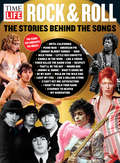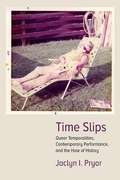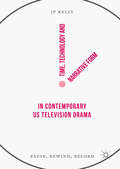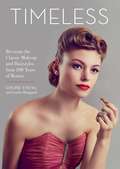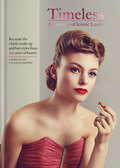- Table View
- List View
Thank You for Coming to Hattiesburg: One Comedian's Tour of Not-Quite-the-Biggest Cities in the World
by Todd BarryFrom the veteran comedian and actor from The Wrestler and Louie comes a hilarious book of travel essays from his time on tour through secondary markets in the US, Canada, and Israel.Hello. It’s Todd Barry. Yes, the massively famous comedian. I have billions of fans all over the world, so I do my fair share of touring. While I love doing shows in the big cities (New York, Philadelphia), I also enjoy a good secondary market (Ithaca, Bethlehem). Performing in these smaller places can be great because not all entertainers stop there on tour; they don’t expect to see you. They’re appreciative. They say things like “Thank you for coming to Hattiesburg” as much as they say “Nice show.” And almost every town has their version of a hipster coffee shop, so I can get in my comfort zone. My original plan was to book one secondary market show in all fifty states, in about a year, but that idea was funnier than anything in my act. So, instead of all fifty states in a year, my agent booked multiple shows in a lot of states, plus Israel and Canada. Thank You For Coming to Hattiesburg is part tour diary, part travel guide, and part memoir (Yes, memoir. Just like the thing presidents and former child stars get to write). Follow me on my journey of small clubs, and the occasional big amphitheater. Watch me make a promoter clean the dressing room toilet in Connecticut, see me stare at beached turtles in Maui, and see how I react when Lars from Metallica shows up to see me at a rec center in Northern California. I’d love to tell you more, but I need to go book a flight to Evansville, Indiana.
Theater and Cultural Politics for a New World: An Anthology
by Chinua ThelwellTheater and Cultural Politics for a New World presents a radical re-examination of the ways in which demographic shifts will impact theater and performance culture in the twenty-first century. Editor Chinua Thelwell brings together the revealing insights of artists, scholars, and organizers to produce a unique intersectional conversation about the transformative potential of theater. Opening with a case study of the New WORLD Theater and moving on to a fascinating range of essays, the book looks at five main themes: Changing demographics Future aesthetics Making institutional space Critical multiculturalism Polyculturalism
The Theater Cat
by Marilyn HelmerFor generations, the LeChats had kept the mouse problem in the Old Lighthouse Theater under control. But Purrcey LeChat doesn't want to hunt mice—he wants to see his name up in lights!
The Theatre of Romeo Castellucci and Socìetas Raffaello Sanzio: From Icon to Iconoclasm, From Word to Image, From Symbol to Allegory
by Dorota SemenowiczThis book focuses on Romeo Castellucci’s theatrical project, exploring the ethical and aesthetic framework determined by his reflection on the nature of the image. But why does a director whose fundamental artistic tool is the image deny this key conceptual notion? Rooted in his conscious distancing from iconoclasm in the 1980s, Castellucci frequently replaces this notion with the words ‘symbol’, ‘form’ and ‘idea’.
Theatrical Design: An Introduction
by Kevin Lee AllenA theatrical designer must address two questions when designing a production: What is the play about and what is the play like? To find the metaphor within a play is to unlock inspired and unique design concepts. Theatrical Design: An Introduction is about how to find the design idea for a production and what to do with that idea once identified. This book emphasizes script analysis and interpretation specifically for designers: how to release meaning and design inspiration from lines and characterization in a script. It then explains the artistic elements and principles of design—the skills necessary to create the design visualized. Concepts are illustrated with examples from theatre, film, art, architecture, and fashion that explore professional and historic use of conceptualization and metaphor. Theatrical Design: An Introduction imparts the tools designers need to innovate off the page.
Theft by Finding: Diaries: Volume One
by David SedarisTHE NEW YORK TIMES BESTSELLER 'He's like an American Alan Bennett, in that his own fastidiousness becomes the joke, as per the taxi encounter, or his diary entry about waiting interminably in a coffee-bar queue' Guardian review of An Evening with David Sedaris The point is to find out who you are and to be true to that person. Because so often you can't. Won't people turn away if they know the real me? you wonder. The me that hates my own child, that put my perfectly healthy dog to sleep? The me who thinks, deep down, that maybe The Wire was overrated?For nearly four decades, David Sedaris has faithfully kept a diary in which he records his thoughts and observations on the odd and funny events he witnesses. Anyone who has attended a live Sedaris event knows that his diary readings are often among the most joyful parts of the evening. In Theft by Finding, Sedaris brings us his favourite entries. From the family home in Raleigh, North Carolina, we follow Sedaris as he sets out to make his way in the world. As an art student and then teacher in Chicago he works at a succession of very odd jobs, meeting even odder people, before moving to New York to pursue a career as a writer - where instead he very quickly lands a job in Macy's department store as an elf in Santaland . . . Tender, hilarious, illuminating, and endlessly captivating, Theft by Finding offers a rare look into the mind of one of our generation's greatest comic geniuses.
Theft by Finding: Diaries: Volume One
by David SedarisTHE NEW YORK TIMES BESTSELLER'He's like an American Alan Bennett, in that his own fastidiousness becomes the joke, as per the taxi encounter, or his diary entry about waiting interminably in a coffee-bar queue' Guardian review of An Evening with David SedarisThe point is to find out who you are and to be true to that person. Because so often you can't. Won't people turn away if they know the real me? you wonder. The me that hates my own child, that put my perfectly healthy dog to sleep? The me who thinks, deep down, that maybe The Wire was overrated?For nearly four decades, David Sedaris has faithfully kept a diary in which he records his thoughts and observations on the odd and funny events he witnesses. Anyone who has attended a live Sedaris event knows that his diary readings are often among the most joyful parts of the evening. But never before have they been available in print. Now, in Theft by Finding, Sedaris brings us his favorite entries. From the family home in Ralegh, North Carolina, we follow Sedaris as he sets out to make his way in the world. As an art student and then teacher in Chicago he works at a succession of very odd jobs, meeting even odder people, before moving to New York to pursue a career as a writer - where instead he very quickly lands a job in Macy's department store as an elf in Santaland... Tender, hilarious, illuminating, and endlessly captivating, Theft by Finding offers a rare look into the mind of one of our generation's greatest comic geniuses.
Theology and the Films of Terrence Malick (Routledge Studies in Religion and Film)
by Christopher B. Barnett Clark J. EllistonTerrence Malick is one of the most important and controversial filmmakers of the last few decades. Yet his renown does not stem from box office receipts, but rather from his inimitable cinematic vision that mixes luminous shots of nature, dreamlike voiceovers, and plots centered on enduring existential questions. Although scholars have thoroughly examined Malick’s background in philosophy, they have been slower to respond to his theological concerns. This volume is the first to focus on the ways in which Malick integrates theological inquiries and motifs into his films. The book begins with an exploration of Malick’s career as a filmmaker and shows how his Heideggerian interests relate to theology. Further essays from established and up-and-coming scholars analyze seven of Malick’s most prominent films – Badlands (1973), Days of Heaven (1978), The Thin Red Line (1998), The New World (2005), The Tree of Life (2011), To the Wonder (2012), and Knight of Cups (2015) – to show how his cinematic techniques point toward and overlap with principles of Christian theology. A thorough study of an iconic filmmaker, this book is an essential resource for students and scholars in the emerging field of religion and film.
Theory and Practice in Eighteenth-Century Dance: The German-French Connection (Studies in Seventeenth- and Eighteenth-Century Art and Culture)
by Tilden RussellThis book is about the intersection of two evolving dance-historical realms—theory and practice—during the first two decades of the eighteenth century. France was the source of works on notation, choreography, and repertoire that dominated European dance practice until the 1780s. While these French inventions were welcomed and used in Germany, German dance writers responded by producing an important body of work on dance theory. This book examines consequences in Germany of this asymmetrical confrontation of dance perspectives. Between 1703 and 1717 in Germany, a coherent theory of dance was postulated that called itself dance theory, comprehended why it was a theory, and clearly, rationally distinguished itself from practice. This flowering of dance-theoretical writing was contemporaneous with the appearance of Beauchamps-Feuillet notation in the Chorégraphie of Raoul Auger Feuillet (Paris, 1700, 1701). Beauchamps-Feuillet notation was the ideal written representation of the dance style known as la belle danse and practiced in both the ballroom and the theater. Its publication enabled the spread of belle danse to the French provinces and internationally. This spread encouraged the publication of new practical works (manuals, choreographies, recueils) on how to make steps and how to dance current dances, as well as of new dance treatises, in different languages. The Rechtschaffener Tantzmeister, by Gottfried Taubert (Leipzig, 1717), includes a translated edition of Feuillet’s Chorégraphie. Theory and Practice in Eighteenth-Century Dance addresses how Taubert and his contemporary German authors of dance treatises (Samuel Rudolph Behr, Johann Pasch, Louis Bonin) became familiar with Beauchamps-Feuillet notation and acknowledged the Chorégraphie in their own work, and how Taubert’s translation of the Chorégraphie spread its influence northward and eastward in Europe. This book also examines the personal and literary interrelationships between the German writers on dance between 1703 and 1717 and their invention of a theoria of dance as a counterbalance to dance praxis, comparing their dance-theoretical ideas with those of John Weaver in England, and assimilating them all in a cohesive and inclusive description of dance theory in Europe by 1721. Published by University of Delaware Press. Distributed worldwide by Rutgers University Press.
A Theory of Regret
by Brian PriceIn A Theory of Regret Brian Price contends that regret is better understood as an important political emotion than as a form of weakness. Price shows how regret allows us to see that our convictions are more often the products of our perceptual habits than the authentic signs of moral courage that we more regularly take them to be. Regret teaches us to give up our expectations of what we think should or might occur in the future, and also the idea that what we think we should do will always be the right thing to do. Understood instead as a mode of thoughtfulness, regret helps us to clarify our will in relation to the decisions we make within institutional forms of existence. Considering regret in relation to emancipatory theories of thinking, Price shows how the unconditionally transformative nature of this emotion helps us become more sensitive to contingency and allows us, in turn, to recognize the steps we can take toward changing the institutions that shape our lives.
There I Go Again: How I Came to Be Mr. Feeny, John Adams, Dr. Craig, KITT, and Many Others
by William DanielsThere I Go Again is a celebrity memoir like no other, revealing the life of a man whose acting career has been so rich that millions of Americans know his face even while they might not recognize his name. William Daniels is an enigma—a rare chameleon who has enjoyed massive success both in Hollywood and on Broadway and been embraced by fans of successive generations. Few of his peers inspire the fervor with which buffs celebrate his most iconic roles, among them George Feeny in Boy Meets World, KITT in Knight Rider, Dr. Mark Craig in St. Elsewhere, and John Adams in the play and film 1776. Daniels guides readers through some of Hollywood’s most cherished productions, offering recollections of entertainment legends including Lauren Bacall, Warren Beatty, Kirk Douglas, Michael Douglas, Audrey Hepburn, Marilyn Monroe, Mike Nichols, Jason Robards, Barbra Streisand, and many more. Looking back on his seventy-five-plus-year career, Daniels realizes that although he never had the courage to say “no” to being an actor, he backed into stardom. With his wife, actress Bonnie Bartlett, by his side, he came to realize that he wound up exactly where he was supposed to be: on the screen and stage.
There Is No F*cking Secret: Letters From a Badass Bitch
by Kelly OsbournePeople ask Kelly Osbourne all the time: “What’s your secret?”Kelly Osbourne may not always have been a typical role model, but no one can say that her perspective isn’t hard won after spending three decades in the spotlight: from growing up completely exposed to the heavy metal scene—replete with crazy antics most readers have only begun to hear about—to spending her teenage years as the wild middle child of an even wilder Ozzy Osbourne, to the family’s popular stint on their wacky eponymous reality show. Since then, Osbourne has forged her own path as a style icon and powerful woman in the media who isn’t afraid to tell it like it is and be honest with her fans. But being the daughter of a music legend hasn’t always been glamorous; growing up Osbourne is an experience that Kelly wouldn’t trade, but there are battle scars, and she is finally now ready to embrace and reveal their origins.Told as a series of letters to various people and places in her life, There Is No F*cking Secret gives readers an intimate look at the stories and influences that have shaped Osbourne’s highly speculated-about life, for better or for worse. The stories will make readers’ jaws drop, but ultimately, they will come away empowered to forge their own path to confidence, no matter how deranged and out of control it may be, and to learn the ultimate lesson: that there just is no f*cking secret.
The Thiri Rama: Finding Ramayana in Myanmar
by Dawn RooneyThe Thiri Rama – or the Great Rama – was written for court performance and is the only known illustrated version of the Ramayana story in Myanmar. Based on palm-leaf manuscripts and scenes carved on over 300 sandstone plaques at a mid-nineteenth-century Buddhist pagoda west of Mandalay in Myanmar, this book presents an original translation of the Thiri Rama rendered in prose. The volume also includes essays on the history and tradition of the Ramayana in Myanmar as well as the cultural context in which the play was performed. It contains many helpful resources, incorporating a glossary and a list of characters and their corresponding personae in Valmiki’s Ramayana. With over 250 fascinating visuals and core text contributions by distinguished Burmese scholars, U Thaw Kaung, Tin Maung Kyi, and U Aung Thwin, this book will greatly interest scholars and researchers of South and Southeast Asian culture, literary forms, epics, art and art history, theatre and performance studies, religion, especially those concerned with Hinduism, as well as folklorists.
This Beats Perfect (This Beats Perfect #1)
by Rebecca Denton'This Beats Perfect is a fabulous celebration of music, friendship, and following your dreams' Katherine Webber, author of Wing JonesAmelie Ayres has impeccable taste in music. Bowie. Bush. Bob. So when she finds herself backstage at The Keep's only UK gig she expects to hate it; after all they are the world's most tragic band. In fact she feels a grudging respect - not (obviously) for their music, but for the work that goes in to making them megastars. And when lead singer, 'Maxx', is not dressed up as a cross between Elvis and a My Little Pony, he is actually rather normal, talented and has creative struggles not too dissimilar to her own. But the next morning she wakes up and rolls over to discover a million new @'s on social media. Overnight, a photo of her at the gig has made her a subject of global speculation. Suddenly the world needs to know #Who'sThatGirl? - but for all the wrong reasons.All Amelie wants is to play her music. She's got the guitar, the songs, the soul and, in the safety of her bedroom, she's got the voice. But when it comes to getting up on stage, she struggles with self-doubt.Immaculate's a concept. Flawless is fake. But just sometimes music - and hearts - can rock a perfect beat.'A witty exploration into the world of celebrity' The Sun
This Is Just My Face: Try Not to Stare
by Gabourey SidibeThe Oscar-nominated Precious star and Empire actress delivers a riveting memoir that is wise, complex, smart, funny, and breaks the mold, just like Sidibe, herself.Gabourey Sidibe - "Gabby" to her legion of fans - skyrocketed to international fame in 2009 when she played the leading role in Lee Daniels' acclaimed movie Precious. In This Is Just My Face, she shares a one-of-a-kind life story in a voice as fresh and challenging as many of the unique characters she's played onscreen. With full-throttle honesty, Sidibe paints her Bed-Stuy/Harlem family life with a polygamous father and a gifted mother who supports her two children by singing in the subway. Sidibe tells the engrossing, inspiring story of her first job as a phone sex "talker". And she shares her unconventional (of course!) rise to fame as a movie star alongside "a superstar cast of rich people who lived in mansions and had their own private islands and amazing careers while I lived in my mom's apartment."Sidibe's memoir hits hard with self-knowing dispatches on friendship, depression, celebrity, haters, fashion, race, and weight ("If I could just get the world to see me the way I see myself," she writes, "would my body still be a thing you walked away thinking about?"). Irreverent, hilarious, and untraditional, This Is Just My Face will resonate with anyone who has ever felt different and with anyone who has ever felt inspired to make a dream come true.
This Is Not Fame: A "From What I Re-Memoir"
by Drew Pinsky Doug StanhopeAn unfiltered, unapologetic, hilarious, and sometimes obscene assemblage of tales from the down-and-dirty traveling comedy circuitDoug Stanhope has been drunkenly stumbling down the back roads and dark alleys of stand-up comedy for over a quarter of a century, roads laden with dank bars, prostitutes, cheap drugs, farm animals, evil dwarfs, public nudity, menacing third-world police, psychotic breaks, sex offenders, and some understandable suicides. You know, just for levity.While other comedians were seeking fame, Stanhope was seeking immediate gratification, dark spectacle, or sometimes just his pants. Not to say he hasn't rubbed elbows with fame. He's crashed its party, snorted its coke, and jumped into its pool naked, literally and often repeatedly--all while artfully dodging fame himself.Doug spares no legally permissible detail, and his stories couldn't be told any other way. They're weird, uncomfortable, gross, disturbing, and fucking funny.This Is Not Fame is by no means a story of overcoming a life of excess, immorality, and reckless buffoonery. It's an outright celebration of it. For Stanhope, the party goes on.
This Might Get a Little Heavy: A Memoir
by Ralphie May Nils ParkerThere was a time when Ralphie May was one of the biggest standup comedians in the country, both by ticket sales and by tonnage. While some things changed—Ralphie lost half his body weight—others did not: he will be remembered as one of the most successful comics of his time. Completed just months before his untimely passing, in This Might Get a Little Heavy, Ralphie takes readers on a behind-the-scenes tour of his life and career, one that winds across the country, over obstacles, beyond heartbreak, and through the golden age of stand-up.Raised in poor, rural, Arkansas by a single mom who struggled to make ends meet, Ralphie’s early years were the perfect breeding ground for the kind of pain and stress and adversity that only comedy can cure. Bitten by the comedy bug at a Methodist sleep-away camp when he was 12 years old, Ralphie seized a once-in-a-lifetime opportunity six years later at an open-mic in a pizza parlor. Mentored and inspired by legendary comedian Sam Kinison to move to Houston, where he got his start, Ralphie packed his bags and never looked back. A major headliner for over twenty-five years, in This Might Get A Little Heavy, Ralphie finally tells the world how a chubby poor kid from Clarksville went from Arkansas to Houston to Hollywood and beyond. Full of never before told stories from Ralphie’s life, This Might Get A Little Heavy will bust your gut, pull at your heart strings, and touch your soul.
Thornton Wilder's The Skin of our Teeth (The Fourth Wall)
by Kyle Gillette"Ladies and gentlemen, I’m not going to play this particular scene tonight." - Sabina Thornton Wilder’s The Skin of Our Teeth (1942) telescopes an audacious stretch of western history and mythology into a family drama, showing how the course of human events operates like theatre itself: constantly mutable, vanishing and beginning again. Kyle Gillette explores Wilder’s extraordinary play in three parts. Part I unpacks the play’s singular yet deeply interconnected place in theatre history, comparing its metatheatrics to those of Stein, Pirandello and Brecht, and finding its anticipation of American fantasias in the works of Vogel and Kushner. Part II turns to the play’s many historic and mythic sources, and examines its concentration of western progress and power into the model of a white, American upper-middle-class nuclear family. Part III takes a longer view, tangling with the play’s philosophical stakes. Gillette magnifies the play’s ideas and connections, teasing out historical, theoretical and philosophical questions on behalf of readers, scholars and audience members alike.
Through a Nuclear Lens: France, Japan, and Cinema from Hiroshima to Fukushima (SUNY series, Horizons of Cinema)
by Hannah HoltzmanThe Franco-Japanese coproduction Hiroshima mon amour (1959) is one of the most important films for global art cinema and for the French New Wave. In Through a Nuclear Lens, Hannah Holtzman examines this film and the transnational cycle it has inspired, as well as its legacy after the 2011 nuclear disaster at Fukushima Daiichi. In a study that includes formal and theoretical analysis, archival research, and interviews, Holtzman shows the emergence of a new kind of nuclear film, one that attends to the everyday effects of nuclear disaster and its impact on our experience of space and time. The focus on Franco-Japanese exchange in cinema since the postwar period reveals a reorientation of the primarily aesthetic preoccupations in the tradition of Japonisme to center around technological and environmental concerns. The book demonstrates how French filmmakers, ever since Hiroshima mon amour, have looked to Japan in part to better understand nuclear uncertainty in France.
TIME Harry Potter: Inside the Tale That Enchanted the World
by The Editors of TIMEThe exploits of Harry Potter brought a new kind of magic to children's literature. Author JK Rowling's uncanny ability to nourish the human hunger for enchantment led people young and na?ve, old and jaded, to surrender to the illusions set forth in Harry Potter's fictional world.
TIME-LIFE Rock & Roll: The Stories Behind the Songs
by The Editors of TIME-LIFEFrom iconic love songs and odes to domestic bliss, to bloodcurdling screams and provocative performances, TIME-LIFE presents a history of rock and roll, and the stories behind the songs.
Time Slips: Queer Temporalities, Contemporary Performance, and the Hole of History
by Jaclyn I. PryorPryor illuminates how each artist deploys performance as a tool to render history visible, trauma recognizable, and transformation possible by laying bare the histories and ongoing systems of violence woven deep into our society.
Time, Technology and Narrative Form in Contemporary US Television Drama: Pause, Rewind, Record
by Jp KellyThis book examines how television has been transformed over the past twenty years by the introduction of new viewing technologies including DVDs, DVRs and streaming services such as Netflix, Hulu and Amazon Prime. It shows that these platforms have profoundly altered the ways we access and watch television, enabling viewers to pause, rewind, record and archive the once irreversible flow of broadcast TV. JP Kelly argues that changes in the technological landscape of television has encouraged the production of narrative forms that both explore and embody new industrial temporalities. Focusing on US television but also considering the role of TV within a global marketplace, the author identifies three distinct narrative temporalities: “acceleration” (24; Prison Break), “complexity” (Lost; FlashForward), and “retrospection” (Mad Men). Through industrial-textual analysis of television shows, this cross-disciplinary study locates these narrative temporalities in their socio-cultural contexts and examines connections between production, distribution, and narrative form in the contemporary television industry.
Timeless: Recreate the Classic Makeup and Hairstyles from 100 Years of Beauty
by Louise Young Loulia SheppardFrom renowned film, TV, and fashion makeup artist Louise Young-along with leading film industry hairstylist Loulia Sheppard, Timeless is the definitive step-by-step guide to the most iconic looks of a century.Timeless is a beauty bible for the golden ages of style. Step-by-step photography and clear, concise instructions help you to recreate the most memorable makeup and hair looks of the past 100 years, including: The silent-screen "vamp" Jazz-Age bob and smoldering eyes 1930s Hollywood glamour World War II-era red lips and victory rolls The 1950s bombshell Swinging '60s London Look Disco-fever beauty The colorful, eclectic '80s Grunge-era chicThroughout, Timeless provides inspiration and instruction on how to recreate the looks of beauty icons like Louise Brooks, Clara Bow, Ginger Rogers, Myrna Loy, Betty Grable, Rita Hayworth, Ava Gardner, Lauren Bacall, Gene Tierney, Grace Kelly, Lucille Ball, Elizabeth Taylor, Marilyn Monroe, Audrey Hepburn, Jean Shrimpton, Sophia Loren, Farrah Fawcett, Julia Roberts, Brooke Shields, Kate Moss, Drew Barrymore, and many more.Accurate, practical, and beautiful, this is the ultimate guide to the most classic looks of all time-a must-have for makeup artists, hairstylists, classic film fans, and anyone interested in incorporating vintage style into the modern day.
Timeless: A Century of Iconic Looks
by Louise Young Loulia SheppardBy Louise Young and Loulia Sheppard, 2018 Academy Award nominee for her hair and make-up design on Victoria and Abdul.'If you haven't heard of Louise Young and are interested in period makeup, or any makeup in fact, then we highly recommend you check out her latest book.' - PIXIWOOThe definitive step-by-step guide to recreating the most striking make-up and hair styles of the 20th century.Timeless is a beauty bible for the golden ages of style from renowned film, television and make-up artist Louise Young, along with Academy Award-nominated film industry hairstylist Loulia Sheppard.Step-by-step photography and clear, concise instructions help you to recreate make-up and hair looks from the past 100 years of beauty, from the dark, smouldering eyes of the jazz-age flapper to the red lips and victory rolls of the 1940s, right up to the electric colours of the 1980s and beyond.Accurate, practical and beautiful, this is the ultimate guide to the most classic looks of all time.Between them, Louise and Loulia have provided make-up and hair styling for stars such as Scarlett Johansson, Keira Knightley and Selma Hayek, and on films including Victoria and Abdul, Fantastic Beasts and Where to Find Them, Pride and Prejudice, Florence Foster Jenkins, Anna Karenina and The Duchess, among many others.
